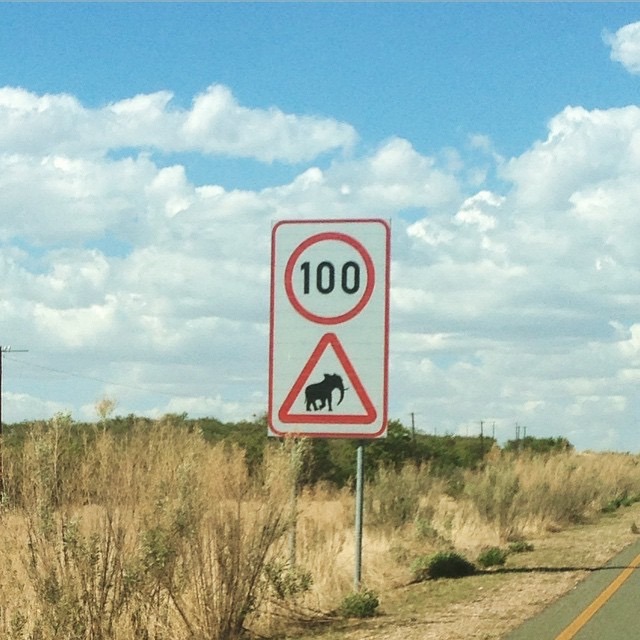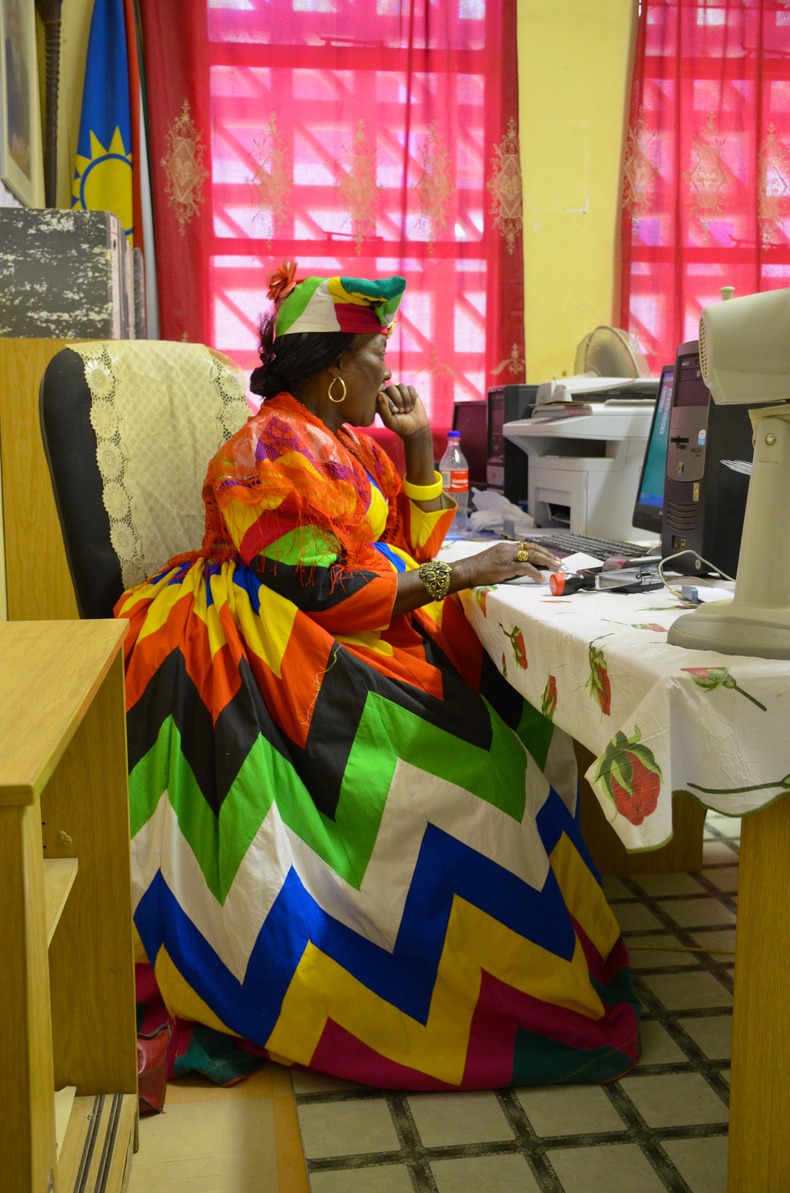
The Secretary of the Otjikaoko Traditional Authority, photo credit Andrew
Opuwo, Namibia. With a population of about 15,000, this is the largest city in the northwestern Kunene region of Namibia. Opuwo is about 700 kilometers north of Windhoek and the drive took about seven hours.
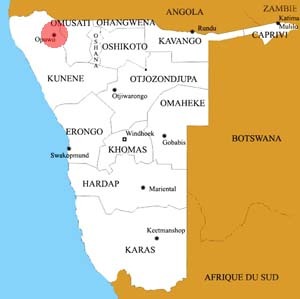
Map showing Opuwo
I chose Opuwo as my first field site because the traditional authorities/community courts are strong here and there are some interesting political dynamics between some of the groups in this region and between the majority political party. The Kunene region also has a variety of interesting groups including the Himba and Zemba. The Himba women cover their hair and bodies with a red clay or ochre. They also wear traditional dress including an elaborate headdress. I cannot imagine how long it takes them to get ready. The Zemba women also use a clay in their hair, though its darker in coloring. They also wear traditional dress which includes brightly colored beads.
As I mentioned before, the red line in Namibia divides the northern and southern portions of the country. This serves as a veterinary border—it is difficult or impossible to move cattle and livestock from north to south—and during colonial times this also marked the police zone. North of the red line, people were more or less left to their own devices while there was a police presence and more structured government below the red line.
Today the Namibian central government has authority in the whole country but you can still see and feel the difference between the North and South. As soon as you go through police check at the red line, there are no more livestock fences. There are cattle, goats, donkeys (and occasionally even elephants!) walking in the middle of the road.
Elephant Crossing sign on the road to Opuwo
Opuwo itself is sort of how you would picture an African town with all sorts of people (Himba, Herero, Zemba, modern) walking around as well as every sort of livestock. Its a bit surreal when you see a group of Himba women riding on the back of a truck or bakkie.
I was pretty nervous that it would be difficult to connect with traditional authorities, those in charge of the community courts. This was for a lot of reasons—language barriers, logisitical barriers and I wasn’t sure if they would want to discuss my research topic with a stranger. Luckily, I was able to find Kulunga who works at a local NGO, HIPO who connected me to seven traditional authorities and served as a language and cultural translator. Even when the TAs speak English, they seemed to prefer to communicate in their native tongue Otjiherero so it was key to have a local translator. I really would not have been able to do any research in Opuwo without him. I mean seriously, how would I have ever connected to unrecognized traditional authorities who live 45 kilometers outside of the city in a village without any signs and no roads?
To provide a bit of background there are 46 recognized traditional authorities (TAs) in Namibia and many unrecognized ones. In northern Kunene there are four recognized and many unrecognized. Three of the recognized TAs are Herero and the other TA is Himba.
The structures, procedures and even subject matter considered varies significantly between different TAs. My project focuses on the impact of customary law on women. The sub-focus has shifted from property/inheritance law to rape cases. In Namibia, sexual assault is a significant problem. As is the case in many countries, very few cases are reported. Of those that are reported, many are withdrawn and/or not prosecuted.
There is alot of technical legal analysis about who has jurisdiction over which type of cases etc. that I will not go into here. What you do need to know is that whether or not this is allowed and proper, compensation cases for rape are decided under customary law. This typically happens informally between families or with input from a village leader or headman—women are also called ‘headmen’—but sometimes cases are also decided at the more formal level in the community court.
The Legal Assistance Centre and researchers did a report on the withdrawal of rape cases in 2009 (http://www.lac.org.na/projects/grap/Pdf/rapeWithdrawn.pdf) and found that the number one reason that rape cases are withdrawn is because of compensation—women report a case to the police, withdraw, and then take the case to the village or TA. The concern is that women are coerced to withdraw a case by their family members, community or the perpetrator. This research focused on community perceptions of why women withdraw cases.
Thus, my research looks at the customary law systems themselves, how rape cases are decided under these systems, and how the criminal and customary systems work—or don’t work—together. A main focus is the decision making power of women in whether or not to report and/or withdraw a case.
After arriving in Opuwo on Sunday evening, we rose bright and early to meet Kulunga on Monday morning. He had two traditional authority meetings scheduled for that day—the Oviana and Otjikaoko TAs. The semi-structured interviews went well. While I expected to speak with people one on one, I spoke with twelve members of the Oviana TA and ten members of the Otjikaoko TA in two large groups respectively. Both groups were Herero (the women wear the victorian dress with many layers and a pointy hat which symbolizes a bull, see photos below).
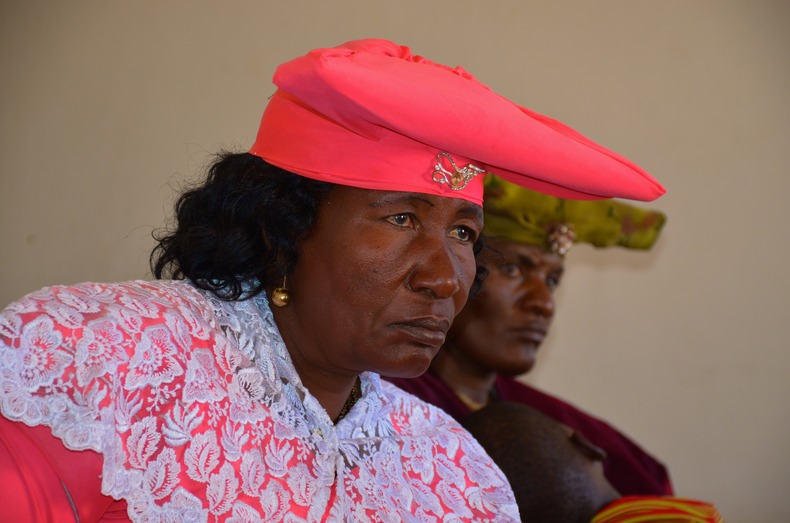
A Councilor of the Oviana Traditional Authority, photo credit Andrew
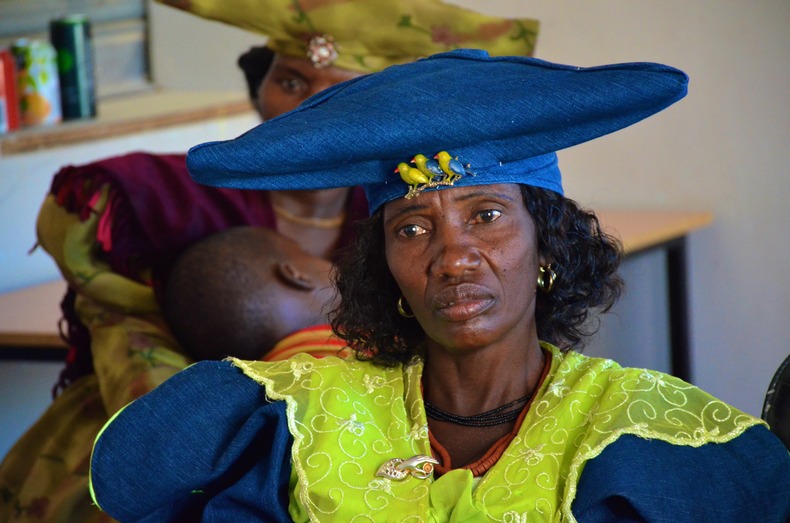
A Councilor of the Oviana Traditional Authority, photo credit Andrew
I learned so much. As a human rights lawyer—and as a human—I sometimes have an idea of the sort of oppression that is happening and who I should blame. And I usually find that I have over-simplified a very complex issue. Here are some of the things that I learned/gained perspective on that first day:
1) Traditional authorities/community courts historically decided rape and murder cases because there were no police for the black people in Namibia. This was the case until fairly recently, especially north of the red line.
2) While I may not agree with all the procedures/rules/laws governing community courts, the goals are noble—to promote peace and harmony within the community and to avoid conflict between individuals and families.
3) Sometimes the group goals (peace, harmony, avoiding conflict) are at odds with individual rights.
4) Decision making power is not seen as solely the discretion of an individual in the Opuwo area. Most important decisions are made by the family and even if an individual disagrees with their parents, they will probably do what their parents want. This is the case even when people are middle aged.
5) Many individuals and groups in Opuwo see sending someone to prison as a greater harm than the crime that he or she has committed—maybe even worse than rape or murder. This may be because prison is a somewhat new concept—there were no prisons until fairly recently.
6) Historically, those who committed crimes were beaten and then they or their family also paid cattle or goats. This was seen as a very effective deterrent due to shame of the accused and the closeness of communities. Today, persons who commit crimes are not beaten but the compensation system remains. This is not considered as effective as the previous system, but not beating individuals is seen as important to meet human rights standards.
7) In some areas in Namibia, the definition of rape is very problematic. It is not considered rape if a cousin rapes you.
8) One person told me that rape cases are not reported unless there is an injury. This means that the rape in itself is not always seen as an injury. It requires an additional injury like a broken arm for some people to consider reporting.
One big lesson that I learned that day: The Otjikaoko TA told me that they stopped hearing rape cases per a government directive (it is not clear whether this entity had the legal authority to make such a directive). They also told me that because of this, women are still not reporting cases to the police but now they are also not reporting cases to the TA. Previously this TA heard about three rape cases a month and now there are zero. In other words, because of this women are not reporting cases to anyone or receiving any sort of remedy. Sometimes good intentions can have perverse consequences. Human rights are very complicated and its important to understand the issue before acting.
Living in the world. Humanitarian. Advocate for health, human rights and equality. Documenting experiences and observations.

